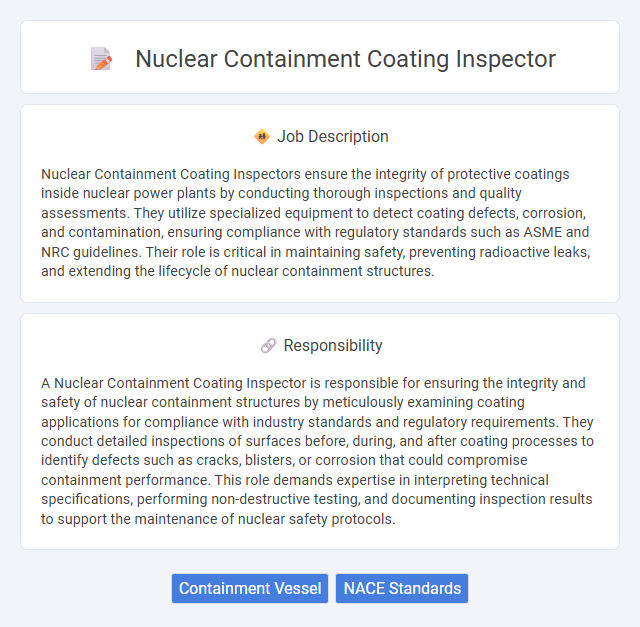
Nuclear Containment Coating Inspectors ensure the integrity of protective coatings inside nuclear power plants by conducting thorough inspections and quality assessments. They utilize specialized equipment to detect coating defects, corrosion, and contamination, ensuring compliance with regulatory standards such as ASME and NRC guidelines. Their role is critical in maintaining safety, preventing radioactive leaks, and extending the lifecycle of nuclear containment structures.
Candidates for the Nuclear Containment Coating Inspector role will likely need a high level of attention to detail and strong observational skills to ensure safety and compliance standards are met. Individuals with backgrounds in industrial inspection or coating application may find this job suitable, while those uncomfortable with strict safety protocols or working in potentially hazardous environments might struggle. The position probably requires physical stamina and the ability to work under pressure, so candidates who thrive in structured, safety-critical roles are more likely to succeed.
Qualification
A Nuclear Containment Coating Inspector must possess a detailed understanding of coating materials, application techniques, and industry standards such as ASTM and NACE certifications. Candidates typically require certifications like SSPC-C3 or NACE Level 2/3, alongside experience in performing inspections within nuclear power plants. Strong knowledge of safety protocols, radiation protection, and nondestructive testing methods is essential to ensure compliance and structural integrity.
Responsibility
A Nuclear Containment Coating Inspector is responsible for ensuring the integrity and safety of nuclear containment structures by meticulously examining coating applications for compliance with industry standards and regulatory requirements. They conduct detailed inspections of surfaces before, during, and after coating processes to identify defects such as cracks, blisters, or corrosion that could compromise containment performance. This role demands expertise in interpreting technical specifications, performing non-destructive testing, and documenting inspection results to support the maintenance of nuclear safety protocols.
Benefit
A Nuclear Containment Coating Inspector likely provides critical assurance that protective coatings meet safety and regulatory standards, reducing the risk of contamination and structural failure. Their role probably contributes to extending the lifespan of containment structures, minimizing costly repairs and outages. Employers may offer competitive salaries and benefits due to the specialized skills and responsibility involved in safeguarding nuclear facility integrity.
Challenge
Nuclear Containment Coating Inspectors likely face significant challenges due to the stringent safety standards and precision required in their work. The probability of encountering hazardous materials and confined spaces may increase the complexity of inspection tasks. Rigorous documentation and adherence to regulatory compliance are often essential, adding to the demanding nature of the role.
Career Advancement
Nuclear Containment Coating Inspectors play a critical role in ensuring the integrity and safety of nuclear reactor containment structures by assessing and verifying protective coatings. Career advancement opportunities in this field often lead to senior inspection roles, quality assurance management, or specialized consulting positions within nuclear safety and regulatory compliance. Continuous professional development and certification in advanced inspection technologies and nuclear industry standards significantly enhance prospects for promotion and higher earning potential.
Key Terms
Containment Vessel
A Nuclear Containment Coating Inspector specializes in evaluating the integrity and application quality of protective coatings on containment vessels to prevent corrosion and radiation leaks. This role requires expertise in industry standards such as ASTM and ASME, ensuring coatings meet stringent nuclear safety regulations. Inspectors utilize non-destructive testing methods and detailed visual assessments to certify the containment vessel's durability and compliance.
NACE Standards
A Nuclear Containment Coating Inspector ensures coating applications comply with stringent NACE standards such as NACE SP0274 for nuclear containment structures and NACE RP0198 for protective coatings. This role demands expertise in inspecting surface preparation, coating thickness, adhesion, and curing processes in line with NACE criteria to prevent corrosion and ensure structural integrity. Mastery of NACE quality control procedures and documentation is crucial for meeting regulatory and safety requirements in nuclear power plants.
 kuljobs.com
kuljobs.com